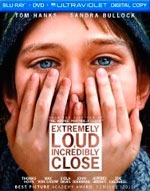

 - for emotional thematic material, some disturbing images, and language.
- for emotional thematic material, some disturbing images, and language.
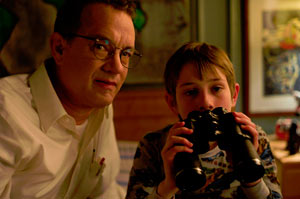 Adapted from the acclaimed bestseller by Jonathan Safran Foer, "Extremely Loud & Incredibly Close" is a story that unfolds from inside the young mind of Oskar Schell, an inventive eleven year-old New Yorker whose discovery of a key in his deceased father's belongings sets him off on an urgent search across the city for the lock it will open. A year after his father died in the World Trade Center on what Oskar calls "The Worst Day," he is determined to keep his vital connection to the man who playfully cajoled him into confronting his wildest fears.
Adapted from the acclaimed bestseller by Jonathan Safran Foer, "Extremely Loud & Incredibly Close" is a story that unfolds from inside the young mind of Oskar Schell, an inventive eleven year-old New Yorker whose discovery of a key in his deceased father's belongings sets him off on an urgent search across the city for the lock it will open. A year after his father died in the World Trade Center on what Oskar calls "The Worst Day," he is determined to keep his vital connection to the man who playfully cajoled him into confronting his wildest fears.
Now, as Oskar crosses the five New York boroughs in quest of the missing lock - encountering an eclectic assortment of people who are each survivors in their own way - he begins to uncover unseen links to the father he misses, to the mother who seems so far away from him and to the whole noisy, dangerous, discombobulating world around him.
(from Warner Bros.)
Everyone experiences and deals with grief differently. On the tenth anniversary of one of America's most shocking tragedies, director Stephen Daldry released his film adaptation of Jonathan Safran Foer's book, Extremely Loud & Incredibly Close--a story that centers around a child's coping with the loss of his father in the World Trade Center disaster. That plot point alone has been cause for some controversy, but the director is no stranger to it. His previous films include The Hours and Billy Elliot, so the fact that Daldry might take on a film like Extremely Loud... is really no surprise. To deliver this emotional drama as effectively as possible, Daldry has enlisted the help of some great A-list talent, including Tom Hanks, Sandra Bullock, Max von Sydow, Viola Davis and Jeffrey Wright. For the film's lead, however, newcomer Thomas Horn has been cast as Oskar Schell, a socially awkward eleven-year-old boy who lost his best friend when his father unexpectedly passed. It's risky for Daldry to cast a kid who's never acted before as his lead, but Horn does suprisingly well, regardless.
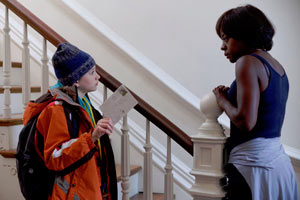 Horn's talents and the way that he and Daldry chose to portray Oskar seem to be things that have polarized audience members. I had mixed feelings myself about Horn and Oskar, and found, after a little online digging, that people either absolutely loved him or absolutely despised him (Of course it's not difficult to find wild opinions on the internet, but this very strong day-and-night reaction to his character sparked some interesting discussions). It's mentioned in passing that Oskar has been tested for Asperger's Syndrome due to some serious social disorders the child struggles with. His father, a jeweler with a passion for science and sending his son on unique adventures and scavenger hunts, was Oskar's biggest support in life. While his mother loved him, they lacked as intimate a bond as Oskar had with him. We never see Oskar in a school setting or with any friends (although he mentions one on occasion and we ever so briefly see them playing Gameboys together in a park in a flashback), so it seems as though his only true friend was his dad. When his father dies in the World Trade Center collapse, his world is shattered, and he desperately struggles to make sense out of his loss. A year after what he calls "the worst day," he decides to venture into his dad's closet where he accidentally discovers a mysterious key within a vase hidden on the top shelf. This discovery sends his mind reeling with the thoughts that if he found what the key was to unlock, it would somehow bring him closer to his dad. He becomes obsessive about the key and all the while grows further and further away from his mother, who also struggles with the loss as well as the distance between her and her son. On the enevelope that contains the key, he finds the word "Black," which he determines is someone's last name, and launches a search to visit every single person in New York's five boroughs who bear that last name (which is quite the feat for a socially awkward eleven-year-old with crippling anxieties). On his journey, he encounters people of all background, race, and belief--some of which are carrying their own burdens of loss and grief. Not much of this seems to impact Oskar, though, and he continues on his obsessive quest, picking up a companion along the way in a mute, elderly man who is renting out an apartment from Oskar's grandmother who lives next door. Played by Max von Sydow, "The Renter" conveys an incredible amount of emotion and believability without ever uttering a sound. He goes along with Oskar's demands and cold treatment, all the while carrying secrets and pain of his own that he refuses to share, except in part, with Oskar.
Horn's talents and the way that he and Daldry chose to portray Oskar seem to be things that have polarized audience members. I had mixed feelings myself about Horn and Oskar, and found, after a little online digging, that people either absolutely loved him or absolutely despised him (Of course it's not difficult to find wild opinions on the internet, but this very strong day-and-night reaction to his character sparked some interesting discussions). It's mentioned in passing that Oskar has been tested for Asperger's Syndrome due to some serious social disorders the child struggles with. His father, a jeweler with a passion for science and sending his son on unique adventures and scavenger hunts, was Oskar's biggest support in life. While his mother loved him, they lacked as intimate a bond as Oskar had with him. We never see Oskar in a school setting or with any friends (although he mentions one on occasion and we ever so briefly see them playing Gameboys together in a park in a flashback), so it seems as though his only true friend was his dad. When his father dies in the World Trade Center collapse, his world is shattered, and he desperately struggles to make sense out of his loss. A year after what he calls "the worst day," he decides to venture into his dad's closet where he accidentally discovers a mysterious key within a vase hidden on the top shelf. This discovery sends his mind reeling with the thoughts that if he found what the key was to unlock, it would somehow bring him closer to his dad. He becomes obsessive about the key and all the while grows further and further away from his mother, who also struggles with the loss as well as the distance between her and her son. On the enevelope that contains the key, he finds the word "Black," which he determines is someone's last name, and launches a search to visit every single person in New York's five boroughs who bear that last name (which is quite the feat for a socially awkward eleven-year-old with crippling anxieties). On his journey, he encounters people of all background, race, and belief--some of which are carrying their own burdens of loss and grief. Not much of this seems to impact Oskar, though, and he continues on his obsessive quest, picking up a companion along the way in a mute, elderly man who is renting out an apartment from Oskar's grandmother who lives next door. Played by Max von Sydow, "The Renter" conveys an incredible amount of emotion and believability without ever uttering a sound. He goes along with Oskar's demands and cold treatment, all the while carrying secrets and pain of his own that he refuses to share, except in part, with Oskar.
I struggle with the fact that Oskar is a tough character to really relate to. Certainly we all can relate to loss and dealing with grief, but Oskar is a cold, troubled, rude, and obnoxious child; there will be plenty of times that you'll want to smack him, while other times you may want to hug him. It's an incredibly deep role for Horn to get his feet wet with as an actor; since he's never done any other acting roles before in his life (he was discovered on an episode of Jeopardy), it's impossible to compare this performance with anything else he has done. So either he played the character as dry as possible, or it's just a reflection of the kind of personality that a smart kid like Horn has. But since Oskar himself is something of a genius, it probably isn't too far off for Horn to inject plenty of himself into his performance. Still, in the end, you have to wonder how much stronger of a film this would have been had the character of Oskar been a bit more warm and relatable as to draw the audience in more (He wouldn't have had to have been blissfully charming either, just likeable in some form). Extremely Loud & Incredibly Close is sentimental and emotional, if not also pretty contrived at times, but it's the players that surround Horn's Oskar that make this film succeed as well as it does. Although I don't think it's "Best Picture" material (it received an Academy Award nomination this year for Best Picture), the movie's acting and direction alone give it strength and validity. Max von Sydown delivers a really incredible performance; it's to the point where I had to look up the Oscar noms from this year to make sure he was at least nominated, and thankfully the Academy acknowledged this seasoned actor appropriately with a nod (unfortunately, he did not win). Sydow's scenes are far more interesting than Oskar's solo ones, and the film is much more interesting and enjoyable when the two are together. The same can be said for when Tom Hanks appears with Horn as well. It's like a completely different film when Hanks is there. Granted, we're supposed to get that "everything is right with the world" feel when Hanks is in the picture before everything falls apart after his untimely death--especially so we can understand what it is that Oskar has lost, but viewers are likely to wish there were more scenes involving Hanks in the film.
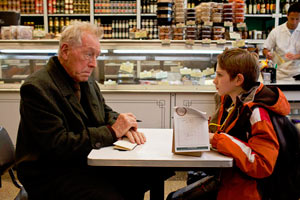 Sandra Bullock is also given a tough role as Oskar's mother. The two barely speak to each other before the film's end, but she too is a likeable addition to the cast, even though she isn't nearly on screen as much as Horn. This really is Horn's film, and as I said before, he does do a great job given the weight of the material here, but it doesn't change the fact that the character of Oskar is really difficult to warm up to and because of that, the movie suffers. If Oskar was less whiny, short with people, rude, cold, and insensitive, Extremely Loud & Incredibly Close may have been a much more powerful film. The ending seeks to wrap things up in as neatly as a bow as it can after the setup that precedes it, which is a little strange given that the film doesn't really seem to be headed for a Hollywood feel-good ending. In fact, it feels like there's a different message and conclusion being readied as we're watching the movie which seems to be missed and maybe wasted by the time things finally come to a head.
Sandra Bullock is also given a tough role as Oskar's mother. The two barely speak to each other before the film's end, but she too is a likeable addition to the cast, even though she isn't nearly on screen as much as Horn. This really is Horn's film, and as I said before, he does do a great job given the weight of the material here, but it doesn't change the fact that the character of Oskar is really difficult to warm up to and because of that, the movie suffers. If Oskar was less whiny, short with people, rude, cold, and insensitive, Extremely Loud & Incredibly Close may have been a much more powerful film. The ending seeks to wrap things up in as neatly as a bow as it can after the setup that precedes it, which is a little strange given that the film doesn't really seem to be headed for a Hollywood feel-good ending. In fact, it feels like there's a different message and conclusion being readied as we're watching the movie which seems to be missed and maybe wasted by the time things finally come to a head.
The content for Extremely Loud & Incredibly Close is of the PG-13 variety for sure. It's mainly earned by the thematic material, which is very, very heavy and emotional. The movie opens with Oskar reflecting on his father and the day he died, so we're introduced to the grief-stricken child story immediately. There is a little bit of language included, with most of it coming from Oskar himself. He uses a play on the "F" word twice, said as "F*kazowa," which sounds pretty stupid and really wasn't necessary (the first was directed at his mother, the other was about someone else which he says in narration near the end). Also, we see that Oskar injures himself as part of his coping method, by pinching skin all over his torso until they look like bruises or welts. Aside from all of that, we see some imagery of the Twin Towers smoking, and some actual footage of them collapsing during a news report on TV. We also see what looks like real photographs of a person jumping to their death off of the World Trade Center towers and there's a brief shot that Oskar imagines of his father plummeting toward the screen with smoke and flames in the distance. It all adds up to very heavy thematic material, and I can't imagine children being interested in a film like this.
Extremely Loud & Incredibly Close is a unique story about one child's handling of grief. There are some truly touching moments that will strike a chord with a lot of viewers, but Oskar's self-absorbed character and insensitive nature will likely alienate other viewers (His behavior is also never corrected by a single person in the film). It's wonderfully cast and wonderfully acted (along with Sodow's scenes, another favorite scene involves just Horn talking to Jeffrey Wright's character), I can understand why it received some enthusiastic response, but ultimately, I can't help but feel as though it could have been a lot stronger and a lot more impactful if handled differently (and, from what I've read, the book version of Oskar was a warmer person than the film version). Extremely Loud & Incredibly Close surely is not for everyone, so unless you're a particular fan of emotional, sad dramas about loss and coping with loss, you may just want to pass this one by.
- John DiBiase, (reviewed: 3/25/12)
The film adaptation of Extremely Loud & Incredibly Close is available on single-disc Blu-Ray, single-disc DVD and a 2-Disc Blu-Ray/DVD/UltraViolet Digital Copy set. The Blu-Ray disc comes with some extras that take a decent look at the story, cast and making of the film and are a nice addition to the set...
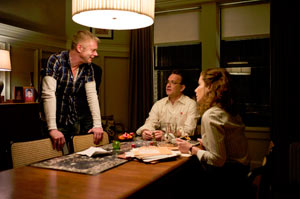 Making Extremely Loud & Incredibly Close (19:47) - Director Stephen Daldry leads this making-of featurette into examining the process of adapting the story from a book into a feature film. Tom Hanks and Sandra Bullock talk about their experiences with working with Daldry and the cast, as well as the art direction and the subtle wardrobe, provided by the legendary Ann Roth. It's great to see a making-of featurette that gives a lot of time to hear from the actors while also providing some good behind-the-scenes footage.
Making Extremely Loud & Incredibly Close (19:47) - Director Stephen Daldry leads this making-of featurette into examining the process of adapting the story from a book into a feature film. Tom Hanks and Sandra Bullock talk about their experiences with working with Daldry and the cast, as well as the art direction and the subtle wardrobe, provided by the legendary Ann Roth. It's great to see a making-of featurette that gives a lot of time to hear from the actors while also providing some good behind-the-scenes footage.
Finding Oskar (7:50) - It turns out that Thomas Horn was discovered on an episode of Jeopardy and has never acted before. All of the central cast and Daldry talk about what it was like to work with Thomas, while Thomas talks about working with the cast and acting for the first time. Everyone in the production gushes about Thomas's talents here as well.
Ten Years Later (11:25) is a powerful story about the film and how, when constructing the memorial wall for the 9/11 victims, they used the photo of a real victim of the 9/11 tragedy who had been a friend of one of the production members. Daldry soon discovered when he began screening the film that this photo of Dan McGinley was resonating with viewers who just so happened to know Dan or his family. We then hear from the McGinley brothers and the mother of another victim who had known Dan as they reflect on the tragedy and their loved ones. It's a wonderful addition to the Blu-Ray.
Max von Sydow: Dialogues with "The Renter" (44:00) - This is a forty-plus minute featurette about Max von Sydow's scenes in the movie. Sydow was nominated for an Academy Award for his performance in this film and it was definitely well-deserved. This segment features a lot of great on-set B-roll footage of Daldry directing Max on set and talking to him about the scenes and his performance. We see Daldry directing the fantastic scene where Thomas plays Oskar the answering machine messages. We also are treated to some footage from a few scenes that don't appear in the film (or on the BD/DVD elsewhere). We see another deleted scene being filmed--a strange one--where Oskar finds "The Renter" sparring with another old timer in a gym. It's good they cut that one. More footage from Sydow's key scenes is shown and it's a really neat behind-the-scenes look at filmmaking that few filmmakers reveal to their viewers. Interestingly enough, all of this footage was directed, filmed and edited by Max von Sydow's son, Cedric Brelet von Sydow!
- John DiBiase, (reviewed: 3/25/12)
Disclaimer: All reviews are based solely on the opinions of the reviewer. Most reviews are rated on how the reviewer enjoyed the film overall, not exclusively on content. However, if the content really affects the reviewer's opinion and experience of the film, it will definitely affect the reviewer's overall rating.
 We Are Messengers and TPR. Celebrate Australia Tour, Marking Continued Global Expansion We Are Messengers and TPR. Celebrate Australia Tour, Marking Continued Global ExpansionWed, 19 Feb 2026 19:02:00 EST |
 Believe Radio Media Group Celebrates Gospel Excellence Believe Radio Media Group Celebrates Gospel ExcellenceWed, 19 Feb 2026 18:50:00 EST |
 Jamie MacDonald Celebrates Dominating Debut Jamie MacDonald Celebrates Dominating DebutTue, 17 Feb 2026 16:17:00 EST |
 PJ Morton's Morton Records Inks New Deal with SRG-ILS Group PJ Morton's Morton Records Inks New Deal with SRG-ILS GroupTue, 17 Feb 2026 16:12:00 EST |
 Freedom Heart Releases "Love Me Differently" To Christian Radio Freedom Heart Releases "Love Me Differently" To Christian RadioTue, 17 Feb 2026 16:06:00 EST |
 Robert Peterson and the Crusade Drops "Sometime" Robert Peterson and the Crusade Drops "Sometime"Tue, 17 Feb 2026 16:00:00 EST |
 Petra Releases "Filthy Lucre" to Christian Radio Petra Releases "Filthy Lucre" to Christian RadioTue, 17 Feb 2026 15:35:00 EST |
 Click here All News Headlines |
Click here All News Headlines |